
American Tariffs: The Impact of “Liberation Day” on the Cocoa Market
- The commodities market is feeling the effects of “Liberation Day" and the tariffs imposed by US President Donald Trump.
- For cocoa, the impact on global commodity prices came after the bean market hit a four-week high, adding another factor to an already volatile market.
- Since the announcement, the cocoa market has seen a series of declines, with the May 25 London and New York contracts closing down 3.8% and 3.7% respectively last Tuesday.
- If the tariffs remain in place, changes are expected in the trade flow and cocoa processing to save American buyers money.
- As a result, a reduction in American cocoa grinding is expected, possibly triggering a rise in domestic prices in the coming months, also reflecting the raising fears of a global recession.
American Tariffs: The Impact of “Liberation Day” on the Cocoa Market
Last week was dominated by President Donald Trump's announcement of new tariffs on U.S. trading partners. The impact of the “Liberation Day" was felt in several commodity markets, with fears that a trade war could reduce demand and potentially lead to a global recession.
US: New Tariffs - Cocoa Market
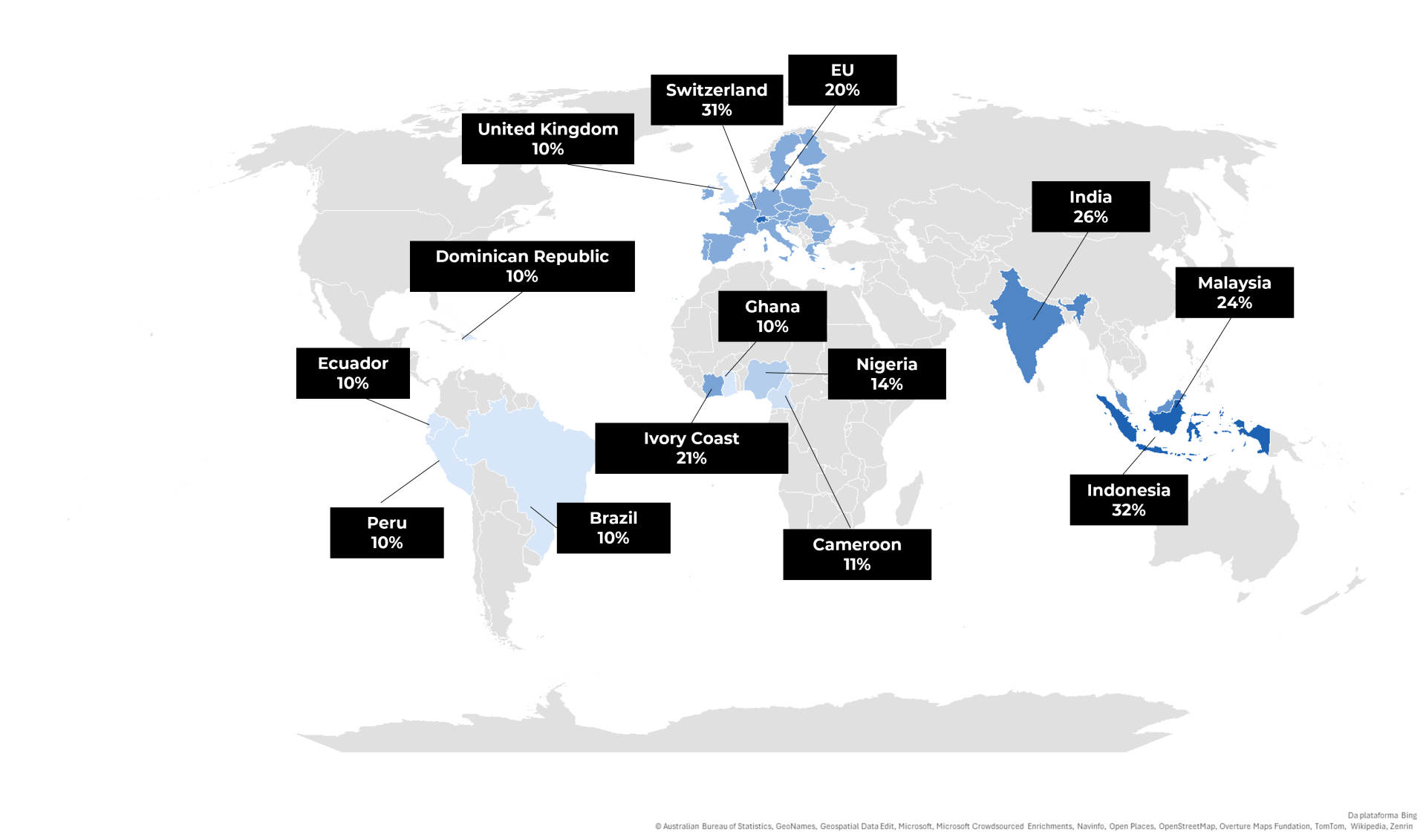
Source: Hedgepoint, Refinitiv
If the tariffs remain in place, it is likely that in the coming months, there will be changes in the flow of trade and processing of cocoa to optimize operations for American buyers. For example, some possibilities include diverting beans to countries closer to the U.S. that have lower tariffs and grinding capacity, such as Canada, Mexico, Brazil and Ghana. In this way, U.S. demand for grains, butter, liquor and powder could be met by processing in other origins.
US: cocoa bean imports by origin (%)
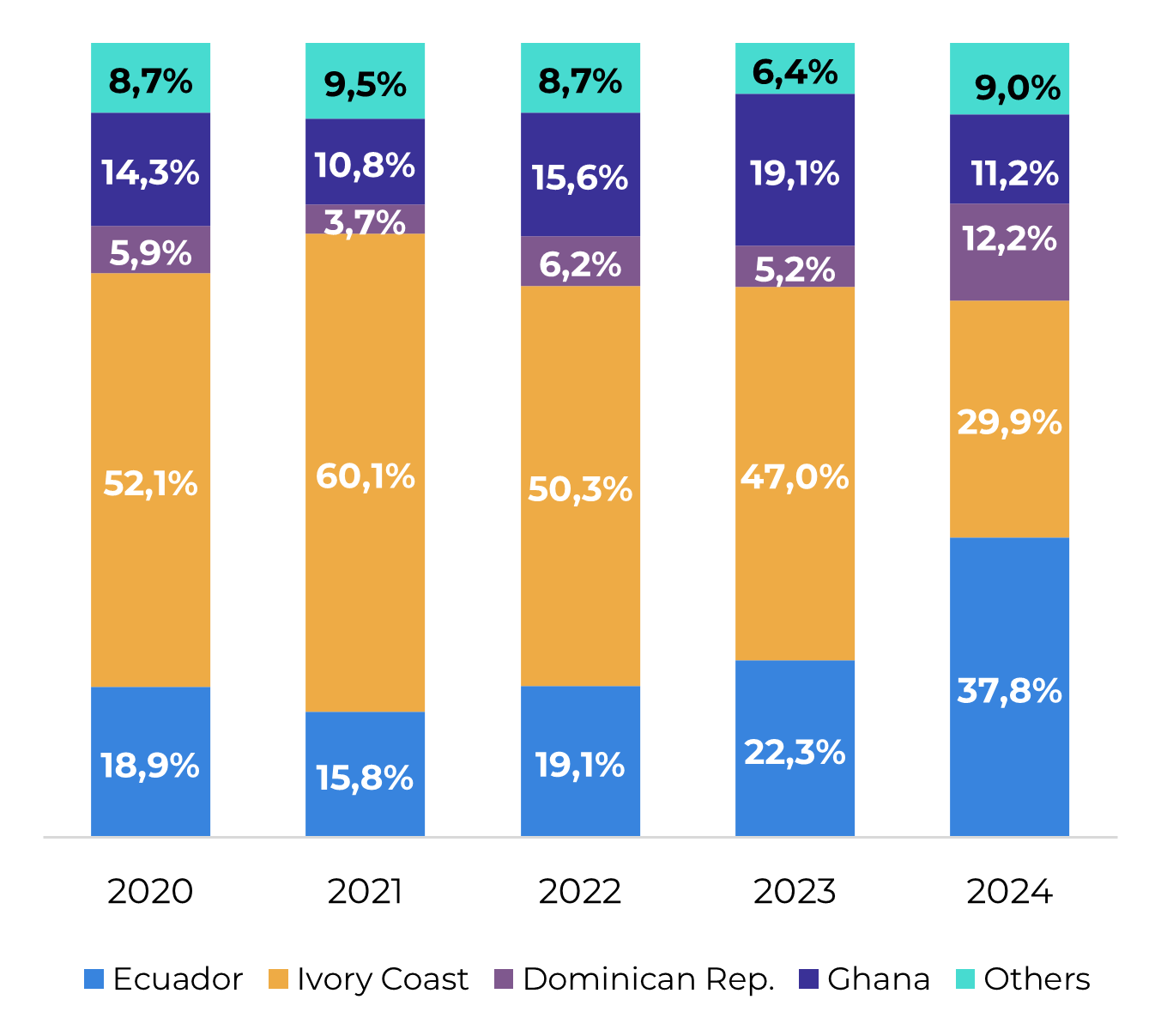
Source: U.S. Department of Commerce
US: cocoa butter imports by origin (%)
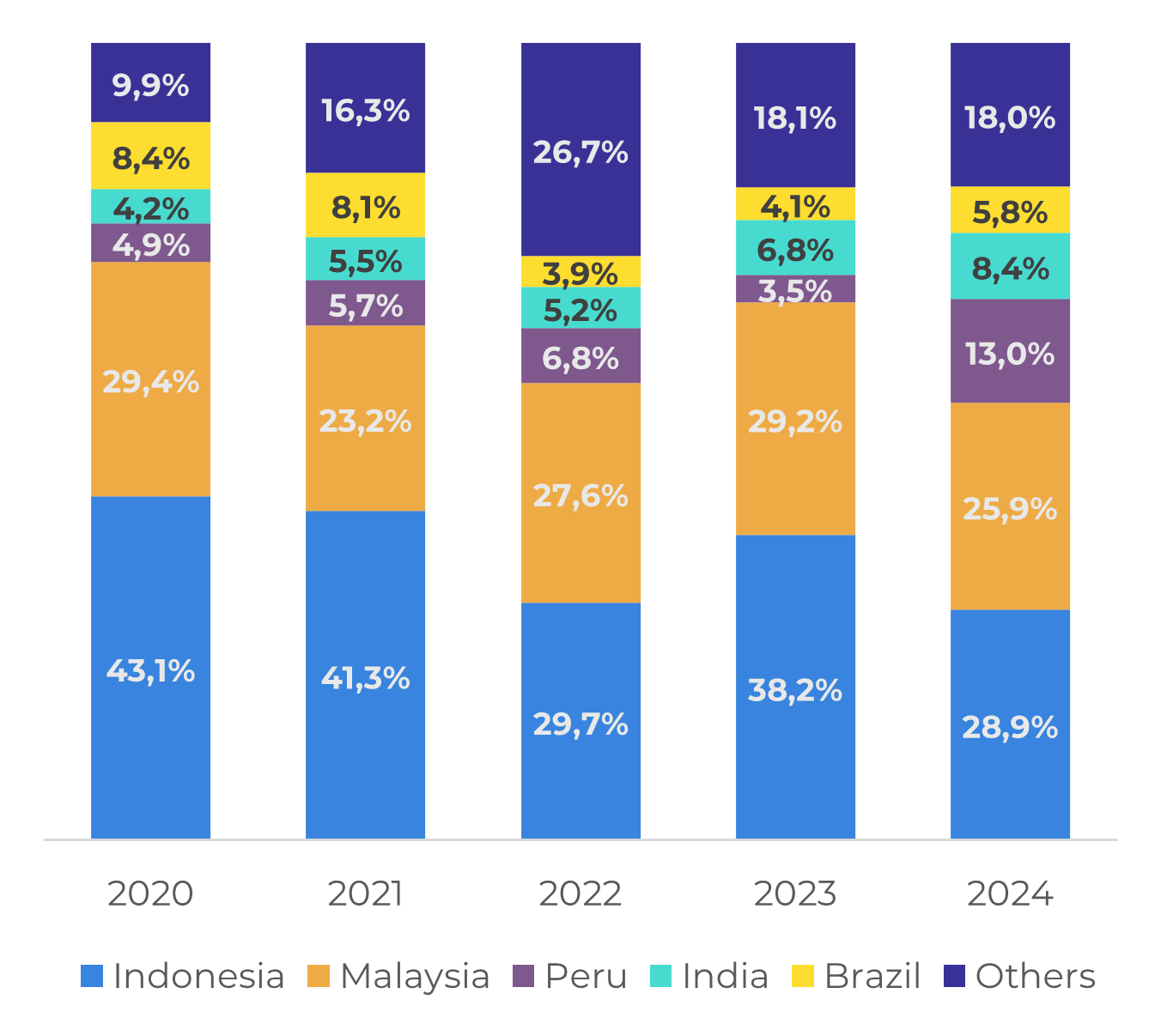
Source: U.S. Department of Commerce
US: cocoa powder imports by origin (%)
US: cocoa liquor imports by origin (%)
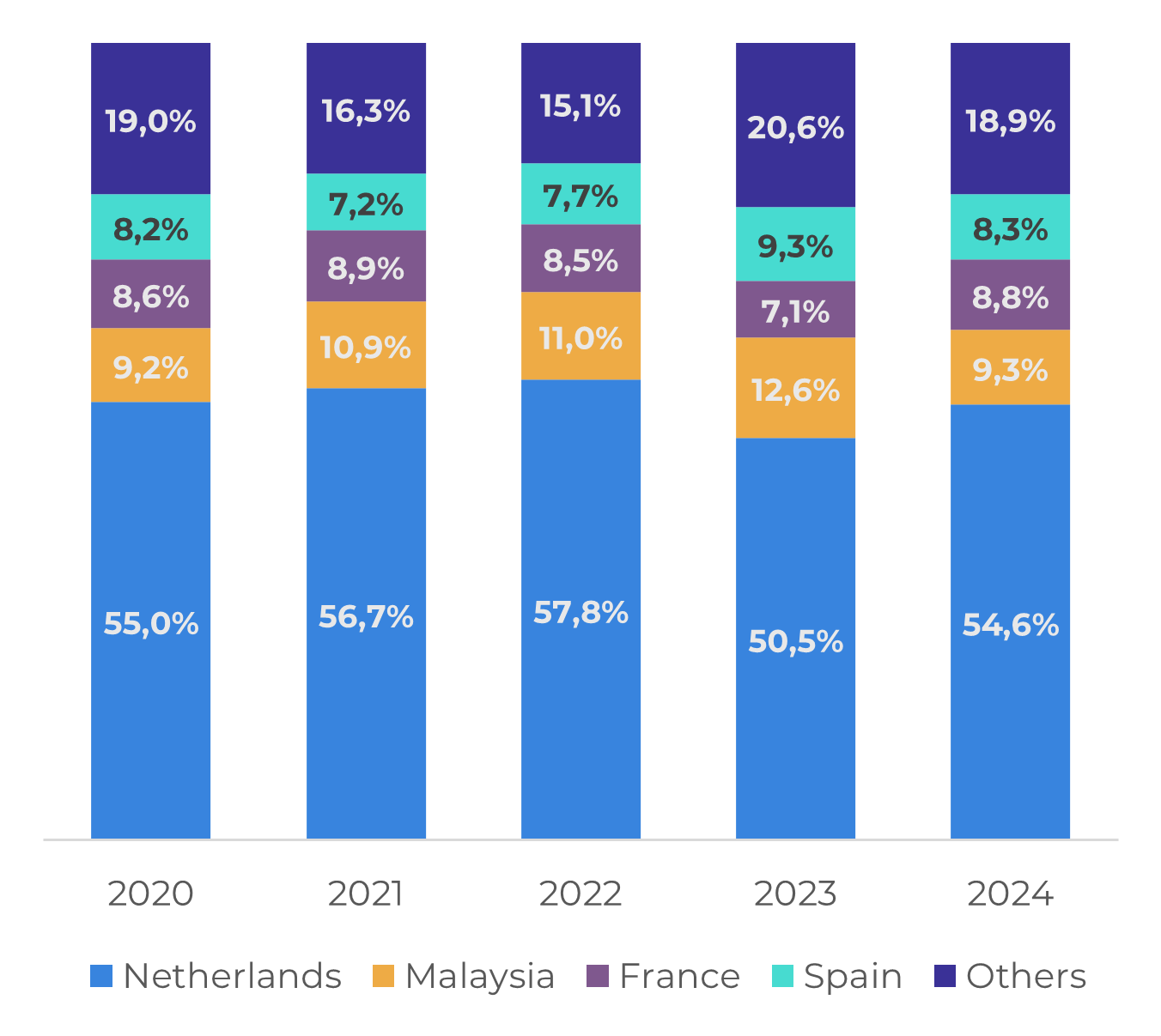
Source: U.S. Department of Commerce
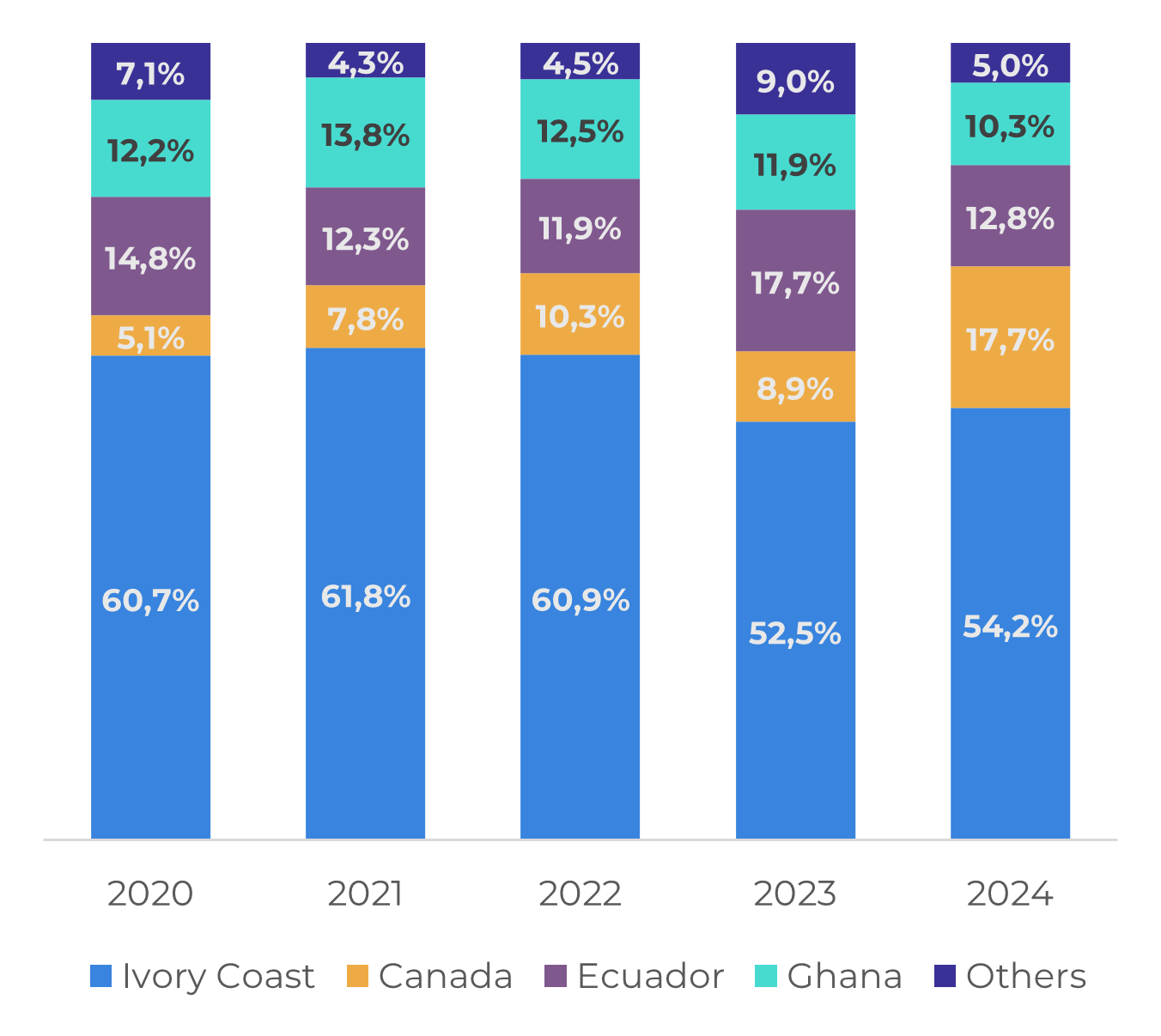
Source: U.S. Department of Commerce
As a result, a reduction in U.S. grindings and higher domestic prices are expected in the coming months, not only for cocoa but also for other products, given the fear of a recession in the U.S. economy. This contributes to the prospect of a drop in the country's demand for cocoa, possibly adding to a global trend already discussed due to historically high prices of the bean since the beginning of 2024.
Cocoa May25 contract prices
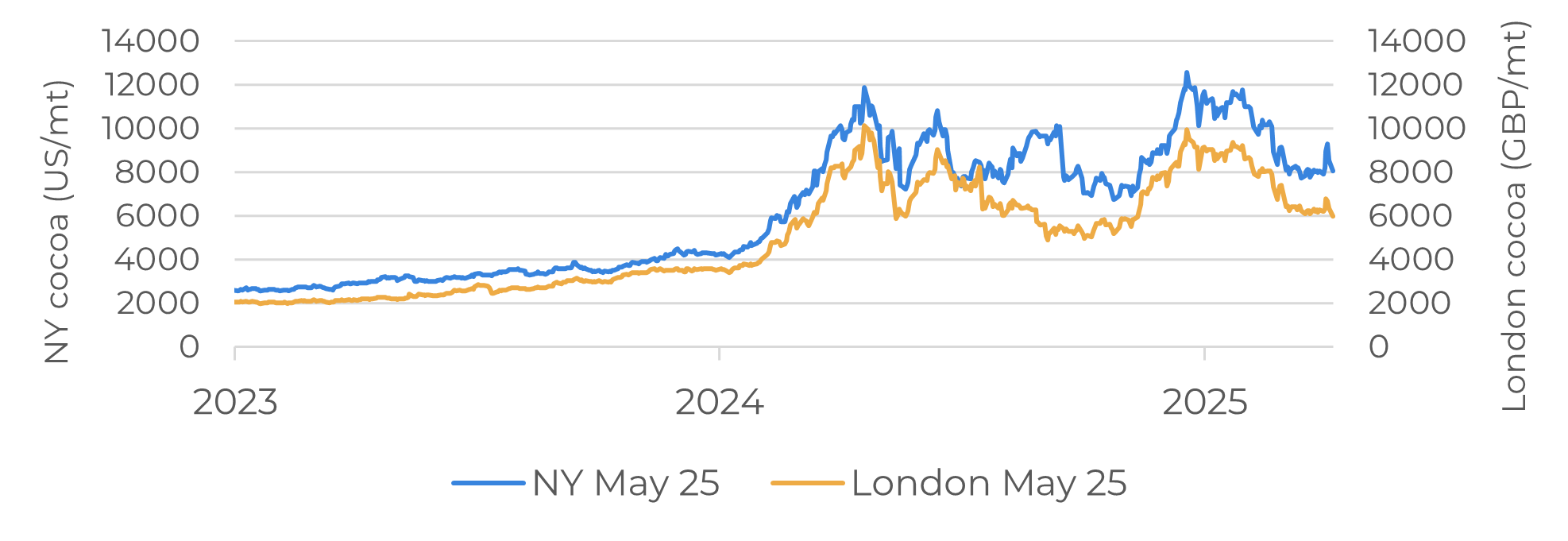
Source: Hedgepoint, Refinitiv
Cumulative Rainfall Estimated for Ivory Coast’s Cocoa Districts (mm)
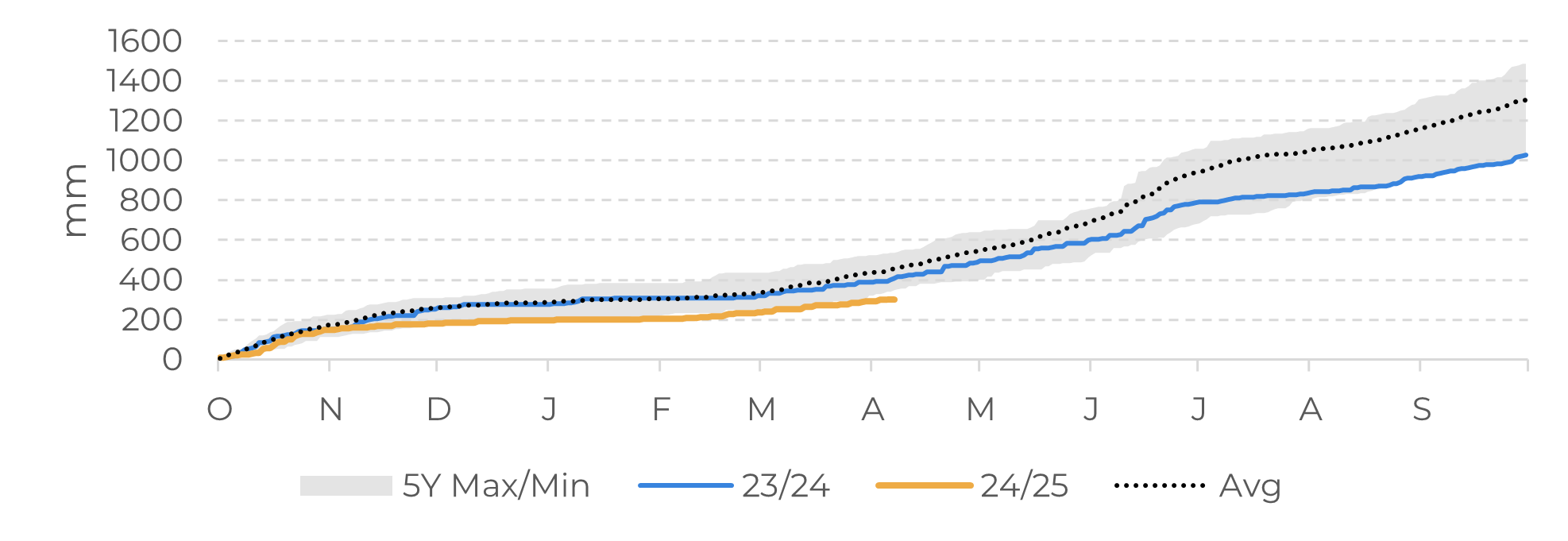
Source: Hedgepoint, Refinitiv
In Summary
Last week was marked by President Donald Trump's announcement of new tariffs on U.S. trading partners. For the volatile cocoa market, the tariffs imposed on major producers and exporters of both beans and by-products caused global prices for the commodity to fall. The U.S is one of the world's largest consumers of cocoa and exporters of chocolate and confectionery. It imports cocoa beans and cocoa products from countries such as Ghana (beans), the European Union (cake and powder), Ivory Coast (beans and liquor) and Malaysia (butter), which are taxed at 10%, 20%, 21% and 25%, respectively. If the current tariffs are maintained, changes in cocoa trade and processing flows are likely to occur in the coming months. As a result, a reduction in American grindings and higher prices in the country are expected in the short to medium term, not only for cocoa but also for other products, with fears of a recession in the American economy. This is contributing to a downward trend in cocoa prices over the medium term.
Weekly Report — Cocoa
carolina.frança@hedgepointglobal.com
livea.coda@hedgepointglobal.com
Disclaimer
This document has been prepared by Hedgepoint Schweiz AG and its affiliates (“Hedgepoint”) solely for informational and instructional purposes, without intending to create obligations or commitments to third parties. It is not intended to promote or solicit an offer for the sale or purchase of any securities, commodities interests, or investment products. Hedgepoint and its associates expressly disclaim any liability for the use of the information contained herein that directly or indirectly results in any kind of damages. Information is obtained from sources which we believe to be reliable, but we do not warrant or guarantee the timeliness or accuracy of this information. The trading of commodities interests, such as futures, options, and swaps, involves substantial risk of loss and may not be suitable for all investors. You should carefully consider wither such trading is suitable for you in light of your financial condition. Past performance is not necessarily indicative of future results. Customers should rely on their own independent judgment and/or consult advisors before entering into any transactions. Hedgepoint does not provide legal, tax or accounting advice and you are responsible for seeking any such advice separately. Hedgepoint Schweiz AG is organized, incorporated, and existing under the laws of Switzerland, is filiated to ARIF, the Association Romande des Intermédiaires Financiers, which is a FINMA-authorized Self-Regulatory Organization. Hedgepoint Commodities LLC is organized, incorporated, and existing under the laws of the USA, and is authorized and regulated by the Commodity Futures Trading Commission (CFTC) and a member of the National Futures Association (NFA) to act as an Introducing Broker and Commodity Trading Advisor. HedgePoint Global Markets Limited is Regulated by the Dubai Financial Services Authority. The content is directed at Professional Clients and not Retail Clients. Hedgepoint Global Markets PTE. Ltd is organized, incorporated, and existing under the laws of Singapore, exempted from obtaining a financial services license as per the Second Schedule of the Securities and Futures (Licensing and Conduct of Business) Act, by the Monetary Authority of Singapore (MAS). Hedgepoint Global Markets DTVM Ltda. is authorized and regulated in Brazil by the Central Bank of Brazil (BCB) and the Brazilian Securities Commission (CVM). Hedgepoint Serviços Ltda. is organized, incorporated, and existing under the laws of Brazil. Hedgepoint Global Markets S.A. is organized, incorporated, and existing under the laws of Uruguay. In case of questions not resolved by the first instance of customer contact (client.services@Hedgepointglobal.com), please contact internal ombudsman channel (ombudsman@hedgepointglobal.com – global or ouvidoria@hedgepointglobal.com – Brazil only) or call 0800-8788408 (Brazil only). Integrity, ethics, and transparency are values that guide our culture. To further strengthen our practices, Hedgepoint has a whistleblower channel for employees and third-parties by e-mail ethicline@hedgepointglobal.com or forms Ethic Line – Hedgepoint Global Markets. “HedgePoint” and the “HedgePoint” logo are marks for the exclusive use of HedgePoint and/or its affiliates. Use or reproduction is prohibited, unless expressly authorized by HedgePoint. Furthermore, the use of any other marks in this document has been authorized for identification purposes only. It does not, therefore, imply any rights of HedgePoint in these marks or imply endorsement, association or seal by the owners of these marks with HedgePoint or its affiliates.

